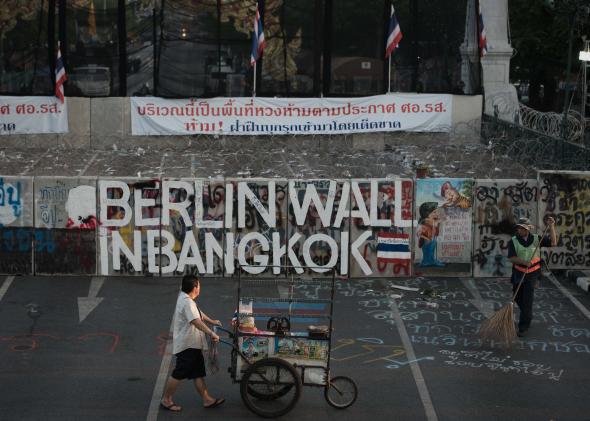The escalating street protests in Bangkok have taken a violent turn with at least three people killed in shootings between rival camps. While they have managed to briefly seize several government buildings and television stations, ant-igovernment protests that began a week ago appear unlikely to accomplish their goal of forcing Prime Minister Yingluck Shinawatra from power. They failed to breach her heavily fortified office yesterday. And likely more importantly, there don’t appear to be any signs that the country’s military or monarchy will support the protests.
All the same, the regularity with which the capital is the scene of deadly street clashes—most notably in 2008 and 2010—is obviously a problem. It’s hard for democratic institutions to develop when political disputes tend to end with a body count. It’s particularly dispiriting in this case given that, prior to the protests breaking out, the country’s democratic institutions seemed to be working the way they are supposed to.
The crisis began in response to an amnesty bill that could have led to the return of former Prime Minister Thaksin Shinawatra, Yingluck’s brother, from exile. The political turmoil of the last few years has tended to circle around Thaksin, who was ousted in a 2006 coup and is currently wanted on corruption charges in his home country. In very broad strokes, Thaksin remains popular among poorer rural voters, who saw him as a populist ally, and despised by the educated, urban middle class, who viewed him as corrupt and authoritarian. Massive 2010 protests by Thaksin’s supporters, known as red shirts, was met with a military crackdown that left 90 people dead. Thaksin opponents, known as yellow shirts, have also launched massive protests in the past.
Yingluck, elected in 2011 and Thailand’s first female prime minister, was seen by opponents as a proxy for her exiled big brother, and the amnesty bill seemed to fit that narrative. The thing is, after being passed by the lower house, the bill was defeated 141–0 in the Senate last month and the government pledged to drop it.
Unfortunately, rather than continue to fight Yingluck’s agenda from the senate, leaders of the opposition Democrat Party resigned from their offices to lead anti-government protests seeing to overthrow her and replace the country’s current democratic system with a vaguely-defined “People’s Council.”
Several authors have noted that Thailand’s political predicament appears to contradict the longstanding idea in political science that as populations become wealthier and more educated, they will become more democratic. In Thailand, the wealthy, urban middle class are perhaps the least supportive of democracy. It’s not the only place where this seems to be the case.
Another obstacle facing democracy in Thailand is the country’s strict lese-majeste laws, which can be used as a cudgel to criminalize political dissent. In the current crisis, both sides have accused the other of disrespecting the monarchy ahead of King Bhumibol Adulyadej’s 86th birthday on Dec. 5.
Thailand’s color-coordinated, class-based politics might also seem to be a product of a growing gulf between haves and have-nots. And indeed, inequality is a serious issue in the country, where the richest 20 percent of Thais possess about 70 percent of the wealth. On the other hand, as Newley Purnell wrote recently in the New Yorker, the country’s level of inequality actually appears to have been decreasing over the recent years of political upheaval.
One might hope that if current trends continue, and more Thais are able to take advantage of the country’s economic growth, a less destructive form of partisan politics might take shape. Unfortunately, the current turmoil isn’t exactly helping Thailand move toward that goal.
